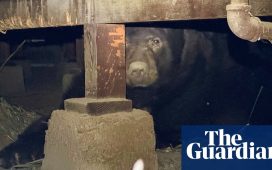Wriggly creatures have always scared Judi Dench. “I’m a person who is frightened of a worm because one jumped inside my sandal when I was a little girl, and we couldn’t get it out,” she said.
So after being cast in the 1987 National Theatre production of Antony and Cleopatra, Dench was terrified when director Peter Hall said there would be live snakes on stage.
In Shakespeare’s play, the Egyptian queen takes an asp (a poisonous snake) to her breast so that its bite will kill her. Her lover, Mark Antony, had earlier taken his own life, dying in Cleopatra’s lap.
“I came home and told Michael about the snakes,” Dench told BBC Radio 4, in a new documentary, Roleplay, to be broadcast on 24 February. Her husband, Michael Williams, who died in 2001, was also an actor. “He said, ‘Jude, you know what you should do. Give them names.’ We came up with Wilson, Keppel and Betty.” They were a well-known vaudeville act from the mid- 20th century, noted for their ancient Egyptian “sand dance”.
Even though the three starring reptiles were garter snakes, which are quite small and not of significant danger to humans, Dench felt more at ease with the nicknames, as if they were pets. It enabled her to cope while playing her death scene, after her maid placed a snake into a sack behind her throne. After Cleopatra’s suicide, her body was then carried, on high, by servants into the audience before returning on stage for the curtain call.
“One night, the boys taking me kept hissing,” Dench said. “I was wondering what on earth was going on. Then, back on stage at the very end of the play, the snake fell out of my wig as I did my bow. I was so scared I lost my voice for two days.”
The National Theatre also used snakes during its production of the play in 2018, with Sophie Okonedo as Cleopatra. While there were no reports of the actors being scared, some in the audience reportedly took fright. There was a warning of “real snakes” on the booking website.
Dench, who has recently turned 90, told other stories from her production in the documentary. In one scene, she, along with her two maids, is ensconced inside a room, unseen by the audience. “One evening I was quietly asked by them what was my favourite supper. I replied, ‘lobster and champagne’. On the last night, in the dark, they put out three plates of lobster and some champagne.”
She said Anthony Hopkins, who was playing Mark Antony, would sometimes whisper to her as he lay dead at the end of act IV. “I’m off now for a nice cup of tea while you do act V,” Dench recalled he said.
Dench was initially surprised to be cast as the Egyptian queen: “I turned to Peter, aghast, and said, ‘You can’t have this extremely dwarfish and menopausal woman as Cleopatra – as she was very tall.” Dench, just over 5ft, was then in her early 50s.
“But Judi’s size didn’t matter,” said Michael Billington, then chief theatre critic of the Guardian. He saw the 1987 production, which he hugely admired. “Judi’s Cleopatra was sharp and intelligent, and, when needed to be, witty.”
after newsletter promotion
Janet Suzman, who is also interviewed in the radio documentary, has played Cleopatra several times as well as directed the play. “Cleopatra need not have been a great beauty,” she told Radio 4. “She wasn’t renowned for that. Shakespeare had read about her that she had a very beautiful voice and was a very interesting character.”
Suzman, however, accepts that the 1963 film, Antony and Cleopatra, shaped many people’s view: “Everybody saw the cleavage and flesh of beautiful Elizabeth Taylor.”
Roger Lewis, author of a new book, Erotic Vagrancy, about Taylor and Richard Burton, told the programme how she “would even wear her high heels in some scenes”. He added: “There wasn’t much acting involved. Nor was it about ancient Egypt. It was a film about celebrity, which, while being shot in late 1962, knocked the Cuban missile crisis off the front page.”













